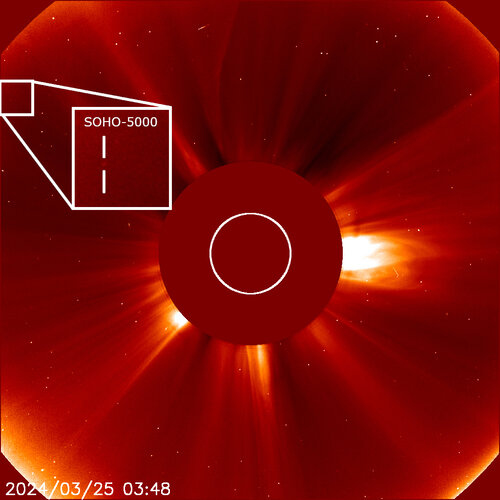A citizen scientist digging through data from the ESA/NASA Solar and Heliospheric Observatory has found the mission’s 5000th comet.
The tiny comet – indicated between the vertical lines in the inset – belongs to the ‘Marsden group’, named after the British astronomer Brian Marsden, who first recognised the group based on SOHO observations. Marsden group comets are thought to be pieces shed by the much bigger Comet 96P/Machholz, which SOHO observes as it passes close to the Sun every 5.3 years.
This 5000th comet was discovered by Hanjie Tan, an astronomy PhD student in Prague, Czechia. Hanjie has been comet hunting since he was just 13 years old, discovering over 200 comets since 2009.
Hanjie explains how he felt upon spotting this comet in the data: “The Marsden group comets represent only about 1.5% of all SOHO comet discoveries, so finding this one as the 5000th SOHO comet felt incredibly fortunate. It's really exciting to be the first to see comets get bright near the Sun after they've been travelling through space for thousands of years.”
Launched in 1995, SOHO studies the Sun from its interior to its outer atmosphere, providing unique views and investigating the cause of the solar wind. During the last three decades, SOHO has become the most prolific discoverer of comets in astronomical history.
The telescope’s prowess as a comet-hunter was unplanned, but turned out to be an unexpected success. With its clear view of the Sun’s surroundings, SOHO can easily spot a special kind of comet called a sungrazer – so-called because of their close approach to the Sun.
Like most who have discovered comets in SOHO’s data, Hanjie Tan is a volunteer citizen scientist, searching for comets in his free time with the Sungrazer Project. This NASA-funded citizen science project, managed by Karl Battams from the US Naval Research Lab, grew out of the huge number of comet discoveries by citizen scientists early into SOHO’s mission.
“Prior to the launch of the SOHO mission and the Sungrazer Project, there were only a couple dozen sungrazing comets on record – that’s all we knew existed,” said Karl Battams, who is the principal investigator for the Sungrazer Project. “The fact that we’ve finally reached this milestone – 5000 comets – is just unbelievable to me.”
SOHO is a cooperative effort between ESA and NASA. Mission control is based at NASA’s Goddard Space Flight Center in Greenbelt, Maryland. SOHO’s Large Angle and Spectrometric Coronagraph Experiment, or LASCO, which is the instrument that provides most of the comet imagery, was built by an international consortium, led by the US Naval Research Lab.
[Image description: A bright orange circle covers almost the whole image, with a smaller disc in the middle. Out of the smaller disc protrude wisps of the Sun's atmosphere. To the upper right of the inner circle, an inset zooms in on a small square, with vertical lines surrounding a faint smudge.]



 Image:
Image: